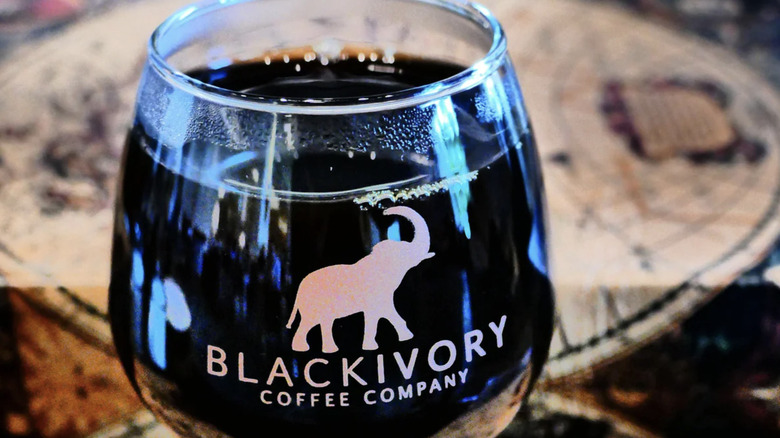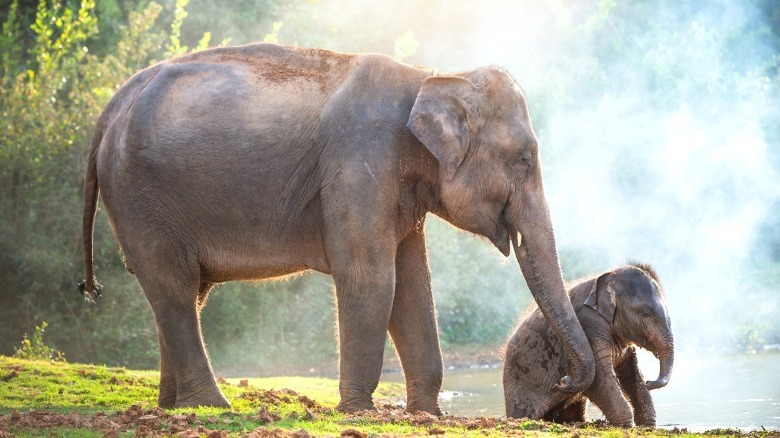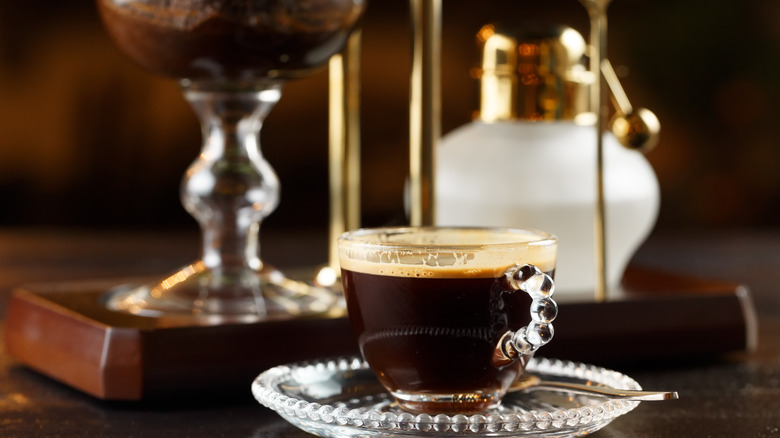The Reason Black Ivory Coffee Is So Expensive
By the time coffee beans are ground and transformed into your morning cup of joe, they've gone through a number of transformations. Once coffee trees bear fruit (called coffee cherries), it is harvested, dried, milled, sometimes shipped all over the world, and finally, roasted. But Black Ivory Coffee is no ordinary java. As one of the rarest coffees in the world, the flavors of this variety are certainly distinct, but what really sets it apart is one additional step in the production process.
The coffee cherries used to make Black Ivory are fed to elephants, then harvested again once the beans — shall we say — pass through the pachyderms. It takes 33 kilograms of coffee cherries to produce just one kilogram of roasted Black Ivory Coffee beans, making the java extremely rare and expensive, selling for about $500 per pound.
Caregivers in Surin, Thailand mix local coffee cherries with some of the Thai elephants' favorite foods, like bananas and tamarind. The beans are churned and "refined" in the animals' giant bellies for anywhere between 12 to 72 hours, before they can be re-harvested, cleaned, dried, and roasted. All of these steps are done by the local community for income, as well as the opportunity to learn how to care for these gentle animals.
Why use elephants to produce coffee?
Blake Dinkin, the founder of the Black Ivory Coffee brand, once worked in the industry that produced Kopi Luwak, one of the world's most expensive coffees. Kopi Luwak is also made using partially-digested coffee beans, but uses civets instead of elephants. Familiar with the process, Dinkin eventually learned of Asian and West African elephants who ate coffee beans in the wild, which sparked his idea of using pachyderms for his own brand of coffee.
Elephants are not affected by coffee's caffeine content like humans are, and seem to enjoy munching on the raw fruit. During the elephant's digestion of the beans, special enzymes reduce bitterness, and the coffee also undergoes a partial fermentation that increases the flavor of the fruit. Essentially, this unusual way of producing coffee makes for a finer cup in the end.
Once ground and brewed, Black Ivory Coffee promises tasty flavors of chocolate, malt, spice, tamarind, and a touch of grass, with no bitterness. To match its steep price tag, the coffee tastes wonderful and unlike any other in the world, creating a rare, memorable treat for the drinker. Additionally, this coffee's production is exclusive to the Black Ivory brand and appears to be ethical for both the elephants and their handlers, while Kopi Luwak is plagued with various animal rights and counterfeiting controversies.
Where can you get Black Ivory coffee?
If you want to order a cup of Black Ivory Coffee, you'll have to visit a handful of hotels, resorts, and Michelin-starred restaurants around the world where it is exclusively served. Wherever you're drinking this special coffee, the brewing process itself is often a production that happens table-side. Brewed in 19th century French-style coffee syphons, the drink slowly drips into a special glass, which the drinker holds by a stem in order to see the color and judge when the brew is at the ideal temperature for sipping. The grandeur deliberately showcases the luxury of the coffee beans.
However, a fancy antique syphon isn't a necessity for making this bougie brew. You can order the beans themselves to be delivered to your home, where you can make the coffee with whatever equipment you have, even a French press, which can great make cold brew (and Black Ivory might make the most decadent iced coffee ever). On its website, the Black Ivory Coffee Company offers various sizes of packages, and the beans are roasted and ready for grinding. A 35-gram package, which makes two eight-ounce cups of coffee, will set you back $150, but coffee aficionados may think the hefty price is worth it for this very rare type of java.



